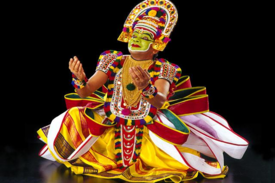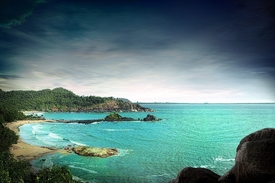11 colorful, vibrant and prestigious festivals are celebrated all over Karnataka and the most famous one is Dasara (Dussehra), on which day the Mysore Palace is decorated and the entire city of Mysore comes together to pay homage to the guardian goddess. The Hampi Festival celebrated in the month of November remembering the Vijaygarha Kings.
The Tulu Sankramana Coorg Festival or Theerthodbhava is a festival of joy in celebration of Goddess Cauvery which is ideally celebrated in the month of October. Believers and followers from all around the world come to take the holy dip in the waters and seek the blessings of the deity. Pattadakkal Dance Festival is an extravagant festival of dance celebrated at the temples of Pattadakkal which is 135kms away from Hampi and is celebrated in the month of January.
The Vairamudi Festival, celebrated in the month of March is in the worship of Lord Vishnu where the idol is decorated and decked up with a diamond-studded crown and brought outside of the Mysore palace. Buffalo Race otherwise known as Kambala is one festival that has been followed and continued in Mangalore and Udupi mainly apart from other surrounding regions, up until today since the days of the royal Kings, as a royal sport.
These races are held typically from November to March. Hoysala Mahotsava is another dance festival celebrated in grandeur in the month of March in Belur and Halebidu, portraying the vivid Hoysala culture of Hoysala rulers, temples, culture and architecture.
Karnataka clearly is a state that holds witness to history extensively and to be able to understand the significance and enjoy the beauty, festivals and art forms have so many stories to portray and as tourists, this is how you experience this state that is filled with so many surprises.
Dasara
Mysore (September / October)
Mysore Dasara is a Royal Festival Celebrating victory of Truth over Evil. Legend has it that the Goddess Chamundeeswari or Durga slew the demon Mahishasuran on Vijayadashami day.
Dasara is a 10-day festival in the region culminating on Vijayadashami or tenth day. The day marks the successful conclusion of the preceding nine days. Vijayadashami is also a day of victory of the King and his subjects, be it in a battle or day-to-day governance. The preceding nine days of Navarathri have celebrations starting only after six days. The sixth day is in honour of goddess Saraswathi. Eight day is dedicated to Durga and Ninth day is for Lakshmi, goddess of wealth. On tenth day a grand spectacular Procession is held which starts from Mysore Palace and ends in Bannimantap.
During Dasara, the entire City is gaily decorated and illuminated. The Palace and other important buildings are illuminated. Cultural programmes by famous artists are arranged in the Palace along with Sports, Wrestling, Poet’s meet, Food Festival, Film Festival witnessed by a large number of people. Dasara Exhibition is arranged in the Doddakere Maidana, by the Karnataka Exhibition Authority, where the public and private sector industries, leading business establishments, Government departments put up their stalls to promote industrial and corporate business for months.
Tula Sankramana (Kaveri Sankramana)
Coorg (October)
Tula Sankramana festival normally takes place in mid-October and is one of the prominent and sacred festivals of the Coorgs. Tula Sankramana is celebrated at Talakaveri the birth place of river Kaveri. On Tula Sankramana day a fountain from a small tank fills the holy tank at Talakaveri. People from all over the state gather at this place to dip in this holy water or Theertha. The Theertha is collected in bottles and reaches every home throughout Coorg. This Theertha is preserved in all Kodava homes. A spoonful of this water is fed to the dying, in the belief that they will attain moksha and gain entry to heaven.
Hampi Festival
Hampi (January / February)
Hampi Festival is the largest festival at Hampi. Generally they are scheduled for 3 days during the first week of November. The celebrations typically packed with shows of music, dance puppet shows fireworks and a pomp procession as the grand finale showcasing the cultural richness of the place. Of late items like rock climbing, water sports and rural sports also has been included in the schedule. The programs are state sponsored and the admission is free. In local language the Hampi Festival is referred as Vijaya Utsav or Hampi Utsav.
Vairamudi Festival
Melkote (March)
An important pilgrim centre Melkote in the Mandya district with several kalyanis, aesthetically and historically significant monuments housed all set to celebrate the Historical Vairamudi festival scheduled to be held on March 22.The temple town not only attracts devotees but also favorite destination for the tourists and it was estimated about one million tourists annually.
Even though the pilgrim centre mainly for the SriVeershanavas, however, the tourists and devotees will not miss who visit to the Sugar district.
Kambala
(Buffalo Race), Southern Coastal Karnataka ( November – March)
Kambala, or traditional buffalo racing, is a hugely popular pastime among villagers along the southern Karnataka coast. Kambala events are usually held between November and March, usually on weekends. Parallel tracks are laid out in a paddy field, along which buffaloes hurtle towards the finish line. In most cases the man rides on a board fixed to a ploughshare, literally surfing his way down the track behind the beasts.
The Kambala races began almost 1000 years ago as a commemoration to the Gods for a better harvest and possibly a source of entertainment for the villagers. Today, almost 150 pairs of buffaloes and their owners take part in the 3 to 4-month-long festival where different races are held over a two-day period. This includes running on a slushy 160-metre track in record time or even creating the highest slush wave.
Karaga
Bangalore (March / April)
Karaga is one of the oldest and widely celebrated festivals of Karnataka. Karaga festival depicts the rich cultural and religious heritage of Karnataka. It is celebrated in honour of the Goddess Shakti. The festival is held at the famous Dharmarayaswamy temple in Bangalore. The festival starts on the full moon day of Chaitra that falls in March/April. The festival derives its name from an earthen pot in which the Goddess Shakti is invoked. The celebrations last for 9 days, starting from the full moon day.The highlight of the festival is a grand procession that is held in honour of Goddess Shakti on the full moon night.
The celebration of Karaga festival in Karnataka can be traced back to over five centuries. It is believed that the festival originated in the Tigala community, a Tamil-speaking community of gardeners in Southern Karnataka. The Tigala community has been carrying forward the tradition of the festival for several centuries.
Kadalekayi Parishe
Bangalore (November)
Kadalekaye Parishe, also known as Peanut festival, it is a traditional followed for more than five millennia by Kannadigas and the migrants who embraced the culture, still creates magic. The fair falls in the month of November. It is held in order to celebrate the first groundnut crop of the year. As a part of the celebrations, the farmers of the city visit the Bull temple to seek blessings of God. The more than a kilometre stretch from Ramakrishna Mutt till the Bull Temple with vendors, buyers, devotees and tourists is testimony to the fact that tradition is kept alive.
The fair begins on the eve of Karthika Somawara (last Monday of Hindu month of Karthika) and is called the chikka parishe (small fair) followed by the dooda parishe (big fair) on the next two days. On every full moon day a bull would charge into the groundnut fields and damage the crop. The farmers then offered prayers to Basava Nandi to stop this and pledged to offer their first crop
Huthri
Coorg (November / December)
Huthri is a traditional harvest festival of Karnataka widely known for the variety of dances and folk songs which are performed on the day of the festival. This harvest festival is celebrated in different parts of the state during the months of November-December. Huthri is celebrated by the Kodava community of Kodagu. The celebration starts of the season’s rice harvests with ceremony, music, traditional dances and much feasting for a week, beginning on a full-moon night. ‘Nerekattu’, tying of the crop, take place at the temple and the first crop would be cut after the puja. The tradition is strictly followed that the rituals would begin in homes all over Kodagu only after it began at Igguthappa temple.
Banashankari Fair
(February / March)
Banashankari Fair is held as a religious cum cultural festival, at the temple precincts every year on the occasion of the Rath yatra, for a period of about three weeks starting from the Rath yatra. Pilgrims from across Karnataka and also the neighboring state of Maharashtra belonging to different religious beliefs, congregate here in large numbers to celebrate the festival.
Maha Mastakabhisheka
Shravanbelagola (Every once in 12 years, next one in 2030)
Mahamasthakabhisheka, the head anointing ceremony is performed once in 12 years to the 57 feet high monolithic statue of Lord Bahubali at Shravanabelagola in Karnataka. One of the highlights of the event is the head anointing that is held for 9 days. The event is held under the leadership of His Holiness Sri Charukeerthi Bhattarakha Swamiji of Shravanabelagola. The anointing last took place in February 2006, and the next ceremony will occur in 2018
Bengaluru Habba
(December)
Bangalore Habba is one of the biggest cultural festival in Bangalore. A signature festival of the state of Karnataka. The city plays host to exquisite performances from varied fields of art, dance, music, theatre and much more. The Habba will also attempt to capture the spirit of Incredible India through the Khadi and Handloom exhibitions, art and flower instillations, folk/theatre festivals and more. Rock and jazz performances, fashion shows and chamber concerts will add to the grandeur of the Habba. The 10-day long festival will bring together young artists from all over Karnataka, celebrating various art forms.
The performances are slated to held across various venues in the city like Chowdiah Memorial Hall, Karnataka Chitrakala Parishath, National grounds, UB City, Seva Sadhan, Bharatiya Vidya Bhavan, Rangashankara, Taj Hotels etc. The Habba is a great platform to encourage young artists and give them an opportunity to showcase their talent, and share the stage with stalwarts.” The vision behind the Habba says Padmini Ravi, Trustee of Artistes’ Foundation for the Arts (AFFA) that spearheads the event, has been “to provide aesthetic entertainment to a wide cultural, social and demographic cross-section of people. We wish to ensure that various art forms continue to have an impact on our culture and traditions.”




